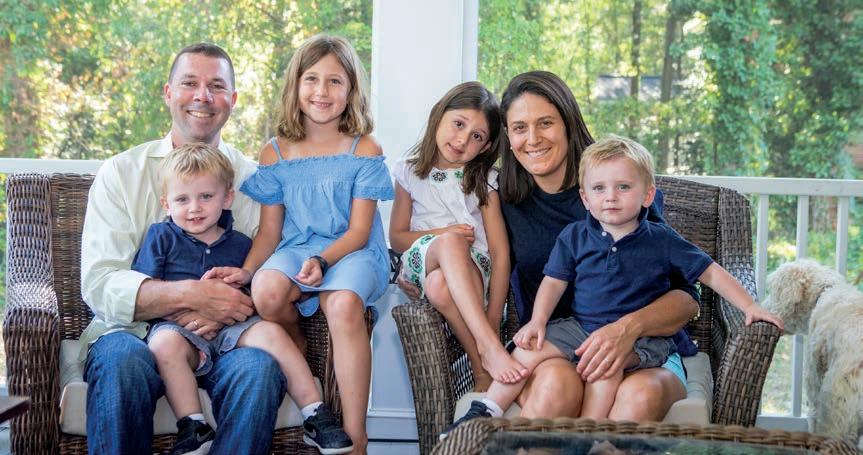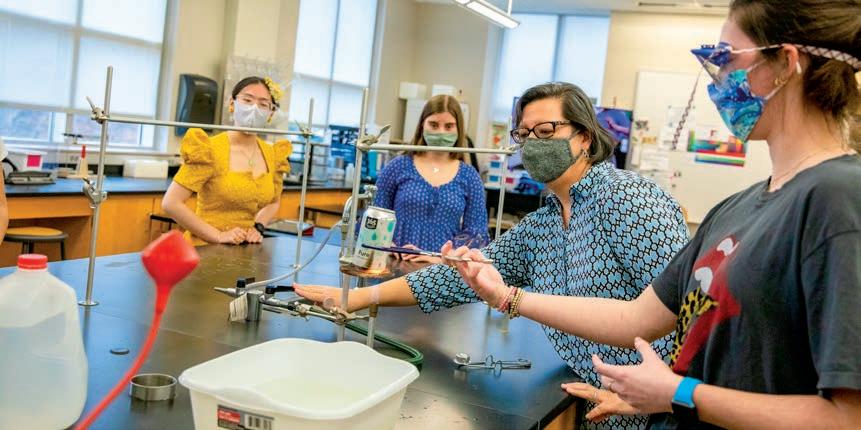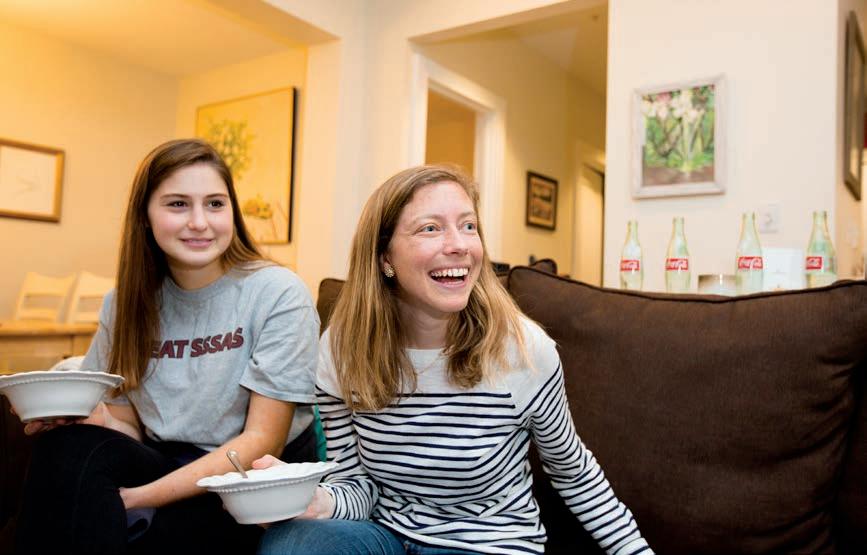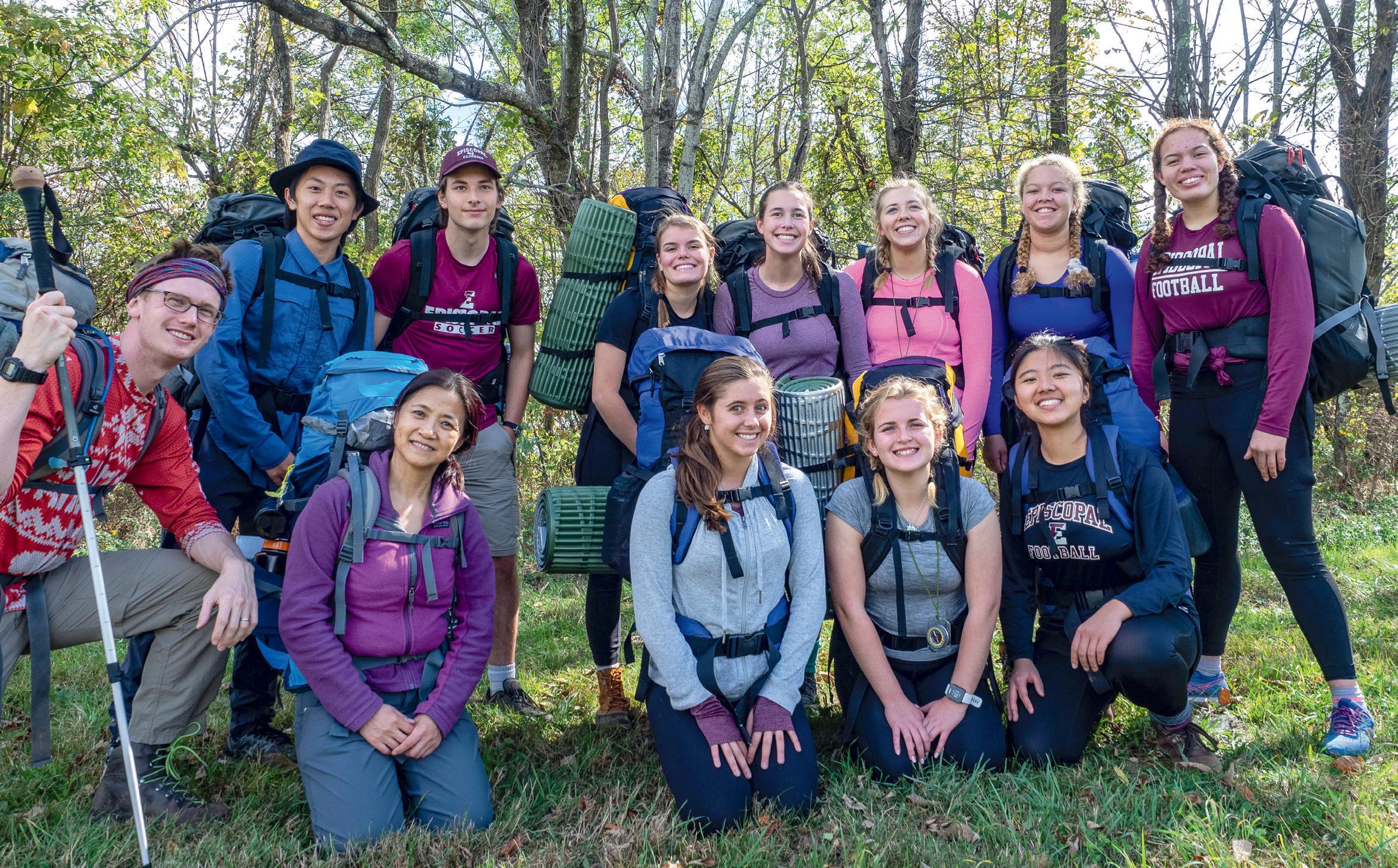
10 minute read
BEYOND TEXTBOOKS
Episcopal faculty share meals with students, raise their families on dorm, and lead excursions into Washington. The result: Special relationships and an education without limits.
Like other teachers at Episcopal, Jim Fitzpatrick has spent much of his adult life on The Holy Hill. He arrived in 2005, when he was 28 years old, after a standout undergraduate basketball career at Wake Forest and a stint coaching at Division I Elon University. While he admits he had no idea what he was getting into at EHS, he hoped to find a deeper connection with students.
He found that connection as well as a community that he’s come to cherish. He met his wife, Girls’ Athletics Director Jen Seferiadis Fitzpatrick, when she interviewed to join the athletic staff, and together they’re raising four children who seem omnipresent on campus, prompting smiles wherever they go. “The longer you’re here, the more connected you are to this place and these people, and the harder it gets to leave,” he says.
Fitzpatrick started in the Admissions Office, later became boys’ athletics director, and will move back to admissions work next year in addition to helping student-athletes navigate the college recruiting process. His wife, Jen, will step into the new role as athletic director of both boys’ and girls’ sports. From dorm duty to advising to living among students, he aims to connect with students at every possible opportunity. Walking around campus, he reminds himself to “be visible and be positive.”

Basketball coach Jim Fitzpatrick counseled his players about how to navigate the pandemic’s challenges. “You’ve got to find a way to rise above it and work through it,” he said.
Fitzpatrick has perhaps the most influence on his basketball players. Entering his 15th year as head of the boys’ program, he is the quintessential coach, relentlessly preaching the benefits of hard work. His Twitter posts highlighting his former players now in college typically conclude with the refrain, “Keep working!”
Fitzpatrick’s team won the state title in 2016, but he tells his teams to find value in the game and the work, regardless of wins or losses. “Whether you win the championship trophy or have a losing season, there has to be success in both,” he says.
The toughest lessons can come from the toughest seasons, he says. The Covid-19 pandemic year, with its canceled interscholastic competition, is no exception. “You have to have resilience,” he says. “You have to be able to face tough situations and moments. And you’ve got to find a way to rise above it and work through it.”
Before dismissing his basketball team following the winter season, Fitzpatrick reflected on the extraordinary year. He reminded them of the power of maintaining a positive attitude as they live through what has been a historic time. “Find the good in it,” he said. “Cherish it. And we’ll have a blast talking about it at your 10-year reunion when I’m still around.”

Kim Olsen paves the way for women in science.
At 30 years old, Dr. Kim Olsen was a tenured professor at Loyola University Maryland, poised to become chair of the chemistry department. Olsen, however, knew the role would leave her less time in the classroom, something that didn’t sit well. She began looking into other options, emailed Episcopal about a job as a chemistry teacher, and quickly received a phone call from a bewildered Jackie Maher, then the assistant head for academics. Maher wanted to know why she would want to leave a tenured position. Olsen’s answer? The students.
Olsen arrived at Episcopal in 2004, as the Baker Science Center was being planned, and quickly began to inspire students — particularly female students. “I feel very responsible to act as a role model for women in science,” she says. And she’s not alone in her department: Two other female Ph.D.s — Dr. Colleen Krivacek and Dr. Kacey Meaker — teach advanced biology and physics.
Arianna Otoo ’21, a standout science student bound for the Massachusetts Institute of Technology, remembers hearing of Olsen for the first time as a ninth grader: “I was awed,” she says. Though interested in STEM, Arianna expected women in the field to be cold and reserved. Olsen, however, “is unapologetically kind, warm, and open,” Arianna says, illustrating the power of being yourself.
Olsen hopes to open all students up to science, especially those who claim they lack an aptitude for the subject. Whether or not they take anything beyond introductory chemistry, she wants to give them tools to move through and understand the world once they graduate. At the end of the year, she hopes to have shown them what it takes to be an informed citizen: “What do they really need to know to be someone who looks at the news and what they’re eating and throwing away and understand how it affects the world around them?”
Olsen keeps in touch with many of her former students and advisees and loves to see them go on to incredible careers, whether in the sciences or not. “Some of my favorite memories were spending afternoons in her classroom preparing for Science Olympiad competitions,” says Bethany Gordon ’12, now a University of Virginia doctoral candidate in civil engineering. “In that space, I learned about how science connects us to the world in countless ways.”
Otoo echoes Gordon: The most important lessons she learned in honors and advanced chemistry with Olsen weren’t always from textbooks or labs: “Being strong means being yourself in spite of adversity, and that science is a place for everyone, regardless of identity or circumstance.”

Norman Kim-Senior believes in the power of local community.
Last year, before the Covid-19 pandemic, Norman Kim-Senior led his Honors Spanish 3 class on deep excursions into Alexandria and the Washington area. They studied the architecture of homes around Episcopal to consider how people live in different neighborhoods. They met the pastor of a church creating affordable housing. And they explored Chirilagua, a neighborhood that’s home to immigrants from El Salvador, Guatemala, Honduras, and Mexico, among other countries.
This year, with Covid-19 limiting off-campus trips, his students studied problems that Covid-19 brought to Alexandria, from the housing crisis to rising unemployment. Kim-Senior encouraged them to envision solutions. “I want my students to think of themselves as capable of contributing something concrete now,” he says, rather than waiting for college or their careers.
Kim-Senior, who has a background in planning and leading international programs, believes that the grounding of education in one’s local community allows for a much deeper cycle of learning, reflection, and relationship building. International experiences are valuable, but the groups travel as tourists, lingering only briefly. In the Washington area — where nearly one of every four residents was born outside the United States — Episcopal can build connections with Spanish-speaking neighbors that will lead to richer learning. “Instead of waiting for that wonderful trip abroad to Spain or Costa Rica, we have this part of American society that has a significant Spanish-speaking population. As a Spanish teacher, I should be connecting to that community here.”
Kim-Senior aims to illustrate the breadth of the Latino experience in Washington. One planned destination: La Cosecha, a burgeoning high-end Latin American marketplace with merchants selling ethical Guatemalan leather, fine Venezualan chocolates, fresh Salvadoran street food, and more. “I want to layer on experiences,” he says, “because I don’t want them to take ‘Latino’ as synonymous with low income. I hope they see the people we meet as dynamic, sophisticated, complicated people with lives that are similar to our own but different in so many ways. We want to learn about what they are proud of, what they’re celebrating, and what challenges they have.”
Last year, Maya Taybron ’22 took part in several Honors Spanish 3 trips to Chirilagua. At La Feria, a bakery and restaurant owned by a Bolivian woman, patrons at the handful of tabletops were surprised to see the group of teenagers file in, but soon they were helping the students order.
Maya says she might never have discovered Chirilagua on her own. The visits to the neighborhood, she says, offered her a window into new cultures and a better understanding of what it means to be an immigrant. “These small businesses are making authentic comfort food for people who are miles and miles away from their countries of origin. Good food goes a long way, especially if you’re going through a rough time.”

Mimi Schwadna walks with students in faith.
Mimi Schwanda’s high school years were defined by faith, which led her to start a Christian Fellowship group at Episcopal. “That was just part of my experience as a teenager. That was the time when I started asking questions about my faith, about God. You’re old enough to want to figure things out for yourself and ask some big questions.”
A few years after arriving on The Holy Hill as a math teacher, Schwanda reconnected with her high school Bible study teacher Alison Holby Poole, who was then teaching English at Episcopal. The two started a Christian Fellowship group for girls, with former Head Chaplain Reverend Gideon Pollach leading the boys’ group. Peter Schwanda, Mimi’s husband, eventually took over from Pollach, and the Schwanda apartment officially became home for the group.
Janie Reynolds ’18 walked into her first Christian Fellowship meeting as she was still looking for her place on campus. “I was having a difficult time and hadn’t really found my group yet,” she remembers. She had heard good things about the group and decided to take a chance. According to Reynolds, Schwanda “did such an incredible job balancing the discussions between our school days and what we were worried or excited about,” while always reiterating that “religious life was relevant even when it might not seem like it.” The approachability and laidback nature of the group immediately put Reynolds at ease: “I never felt quite so at home at EHS than when I was in the Schwandas’ apartment.”
Since the genesis of Christian Fellowship, its major throughline has been acceptance. All are welcome and encouraged to be themselves, no matter their year, their friends, or the strength of their faith. Schwanda hopes that, for the one hour spent together talking about their beliefs, students see her and Peter as fellow Christians rather than their math teacher and her husband. She meets students at their level, reminding them that while she and Peter “have a little bit of wisdom to share because we’re older,” they’re most importantly “Christians in the mix trying to figure out life.”

Hugh Koeze helps freshmen settle in — and step out of their comfort zone.
Every year, English teacher Hugh Koeze (at left in photo) leads a group of ninth graders on a nighttime hike during one of the Outdoor Leadership programs. “Hike” is generous, he jokes — they walk only about a half-mile — but the night always makes it feel more arduous and adventurous. The trail is pitch black, lit only by the narrow beams of their headlamps, and the students walk in silence. Upon reaching the clearing, the group sits quietly, listening to the sounds of the woods and contemplating their place in nature.
After returning to camp, Koeze lights a candle, and they discuss what that moment of reverie in the dark yielded. They open up in ways he didn’t think possible: “It’s so rare for them to be completely out of their normal environment and in this place where they can share and pay attention to their thoughts. It’s just incredible.”
This is how Koeze approaches his teaching. 1 — Nudge students out of their element. 2 — Establish trust. 3 — Listen. For freshmen, he finds that meeting them where they are is often the most effective tactic. “It’s a fundamental fact of freshman year that anyone can stumble at any point,” he says, regardless of their grade-point average or elementary-school record. Koeze’s job: Help them get back up.
A graduate of St. Paul’s School in New Hampshire, Koeze understands the boarding school experience more than most. He says of the freshman boys on Hummel: “It’s so difficult for them to even understand their feelings, let alone talk about them.” From classroom anxieties to social pressures, they benefit from his shared experiences and his patience as he helps them to work through their problems. One of the younger faculty members on campus, Koeze can easily tap into those old feelings. “I had all the same problems,” he recalls.
Of life on Hummel: “There’s a level of creativity and zaniness that you don’t see anywhere else on campus.” Getting the chance to observe the students (both underclassmen and their upperclassmen prefects and monitors) day in and day out, Koeze has more stories than he could possibly tell of made-up games and unpredictable moments. “You come across nonsense all the time, but it’s really endearing and wonderful,” he laughs. “There is no purer a community than a community of ninth-grade boys.”







